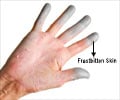Learn when to be concerned about cold extremities and how to cope with tips from the Doctor.
- Recognizing symptoms like skin changes and fatigue is crucial for identifying serious conditions
- Coping strategies include wearing warm clothing and avoiding vasoconstrictors like caffeine
- Older adults should be vigilant about peripheral artery disease symptoms, such as leg cramping and foot sores
My Hands and Feet Are Always Cold - Should I Worry?
Go to source).
Cold hands and feet could signal underlying health issues. #healthtips #vascularhealth #medindia’
But when should you Start Worrying about Cold Hands and Feet?
According to vascular medicine specialist Dr. G. Jay Bishop, cold hands and feet are frequently reported complaints, especially among young, healthy individuals. While they can sometimes indicate more serious conditions like peripheral artery disease (PAD), rheumatologic disorders, or thyroid issues, they are often associated with Raynaud’s phenomenon.Raynaud’s phenomenon involves sudden and excessive constriction of blood vessels in the fingers and toes when exposed to cold. This condition is generally harmless, characterized by temporary color changes in the affected areas.
Signs of Raynaud’s Phenomenon: In Raynaud’s, affected fingers may turn white, then blue or purple, and finally red as they rewarm. While these color changes might be alarming, they are typically harmless in individuals with primary Raynaud’s, meaning no underlying disease is present.
However, Raynaud’s can also manifest alongside rheumatologic or vascular diseases, which may lead to additional symptoms like skin changes, nail abnormalities, or persistent sores and cracks.
Recognizing Serious Symptoms
It’s essential to consult a doctor if you experience cold extremities along with symptoms such as:- Thickening or tightening of the skin
- Poorly healing sores or cracks on the fingertips or toes
- Weight changes
- Fever
- Joint pain
- Rashes
Coping Strategies
If your doctor has ruled out serious conditions and you’re left dealing with persistently cold extremities, there are strategies to help manage discomfort:Keep your feet warm: Wear appropriate footwear and layer socks as needed.
Warm up your hands: Opt for mittens over gloves and consider using hand warmers.
Layer clothing: Dress in thin, warm layers to maintain core temperature, adjusting as needed.
Avoid vasoconstrictors: Limit consumption of caffeine and nicotine, which can worsen the effects of cold.
Peripheral Artery Disease (PAD) in Older Adults
In older individuals, cold hands and feet might be indicative of PAD, a condition where arteries narrow due to plaque buildup. People over 50 with a history of diabetes or smoking, and those over 70, should be particularly vigilant about PAD symptoms, which can include leg cramping, hair loss on the shins, and painful foot sores.Ultimately, being attuned to your body is key to maintaining good health. Dr. Bishop advises paying attention to new or persistent symptoms, as they could signal underlying issues. If you experience recurring discomfort or unusual sensations, don’t hesitate to discuss them with your healthcare provider.
In conclusion, while cold extremities are often benign, they can sometimes indicate more serious conditions. By understanding the potential causes and knowing when to seek medical advice, individuals can better manage their symptoms and safeguard their health.
Reference:
- My Hands and Feet Are Always Cold - Should I Worry? - (https://health.clevelandclinic.org/why-are-my-hands-and-feet-always-cold-and-should-i-worry)
Source-Medindia













